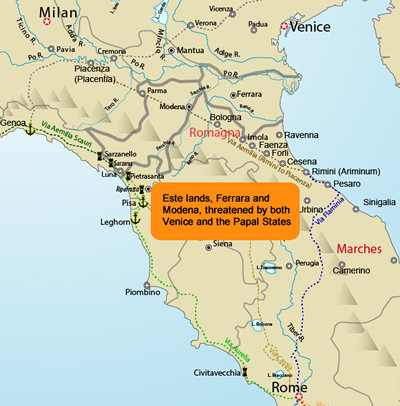Chapter 2: Concerning Hereditary Principalities
I will leave out all discussion on republics, inasmuch as in another place I have written of them at length, and will address myself only to principalities. In doing so I will keep to the order indicated above, and discuss how such principalities are to be ruled and preserved.
I say at once there are fewer difficulties in holding hereditary states, and those long accustomed to the family of their prince, than new ones; for it is sufficient only not to transgress the customs of his ancestors, and to deal prudently with circumstances as they arise, for a prince of average powers to maintain himself in his state, unless he be deprived of it by some extraordinary and excessive force; and if he should be so deprived of it, whenever anything sinister happens to the usurper, he will regain it.
We have in Italy, for example, the Duke of Ferrara, who could not have withstood the attacks of the Venetians in '84, nor those of Pope Julius in '10, unless he had been long established in his dominions. For the hereditary prince has less cause and less necessity to offend; hence it happens that he will be more loved; and unless extraordinary vices cause him to be hated, it is reasonable to expect that his subjects will be naturally well disposed towards him; and in the antiquity and duration of his rule the memories and motives that make for change are lost, for one change always leaves the toothing for another.


Holding an Hereditary State
Machiavelli’s prototype case-study example of a hereditary principality is Ferrara under the Este Family. Owing to its location, Ferrara was menaced by both the forces of the Papal States and by Venice. The two incidents that Niccolò mentions here are the following:
In 1482, an alliance of Venice and Pope Sixtus IV attacked Ercole I d'Este, duke of Ferrara. With the help of his own allies, Ercole outlasted the papal forces and the conflict ended in 1484 with the Peace of Bagnolo.
After accepting French help in the League of Cambri war (against Venice), Pope Julius II formed the Holy League to drive the French from Italy. Because Alfonzo remained a French ally, Pope Julius II excommunicated him and officially deprived him of Modena (in 1510) and Reggio (in 1512). However, even though the two Medici Popes (Leo X, Pope from 1513 to 1521 and Clement VII, Pope from 1523 to 1534) remained enemies of the Este, Alfonso regained Reggio in 1523 and Modena in 1527. Outliving Clement by 7 years, Alfonso was able to pass his state to his son Ercole II.
For more about the Este family, see the entry in the People section.
By saying that “the hereditary prince has less cause and less necessity to offend” Niccolò implies that a prince always has some cause and necessity to offend. He assumes that in the processes of getting and keeping power, there are irreducible conflicts of interest
In modern terminology, we would say that conflicts are inevitable because goods are scarce. In The Discourses, Niccolò puts it this way:
“But, further, since the desires of men are insatiable, Nature prompting them to desire all things and Fortune permitting them to enjoy but few, there results a constant discontent in their minds, and a loathing of what they possess, prompting them to find fault with the present, praise the past, and long for the future, even though they be not moved thereto by any reasonable cause.” - Discourses Preface to Book II.
This is the first mention of hatred, which plays an important role in Niccolò’s analysis of power politics. When he uses the term translated as hatred, Niccolò means not just dislike, but an extreme, irreconcilable dislike that is strong enough to motivate revenge and perhaps irrational retaliation. Avoiding hatred is one of Machiavelli’s recurring themes, which he will delineate further in Chapter 19: “That One Should Avoid Being Despised and Hated.”